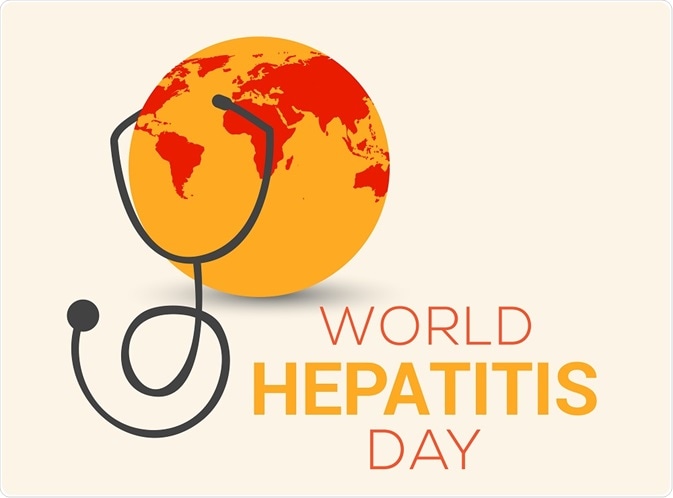Hepatitis D is a viral infection that causes liver inflammation (swelling of the tissue which occurs due to injury or infection) and damage. Symptoms are typically similar to those of the flu, and the infection is transmitted through the sharing of contaminated needles or bodily fluids.
 Image Credit: lustrous / Shutterstock
Image Credit: lustrous / Shutterstock
Hepatitis D or hepatitis delta virus is a small ribonucleic acid (RNA) particle that causes infection only in the presence of the hepatitis B virus. It is estimated that about 15 million people carrying hepatitis B virus worldwide are infected by the hepatitis D virus.
Hepatitis D infection
Hepatitis D virus infection occurs in two forms: firstly, it is caused by the co-infection with hepatitis B and hepatitis D virus, and this results in a more severe acute hepatitis infection with a higher mortality rate than seen with acute hepatitis B infection alone that rarely results in chronic infection.
The second form of hepatitis D infection is a superinfection (second infection superimposed on an earlier one) of hepatitis D virus in a hepatitis B virus carrier, and can be termed as a severe “acute” hepatitis in previously asymptomatic hepatitis B virus carriers, or as an exacerbation of underlying chronic hepatitis B.
Hepatitis D virus can cause a chronic, acute or dual infection. Acute hepatitis D is a short-term infection, whereas chronic hepatitis D is a long-lasting infection. Chronic hepatitis D occurs when the body is not able to fight off the virus, and the virus does not go away. People who have chronic hepatitis B alone less prone to complications compared to those who have both chronic hepatitis B and D.
Symptoms of hepatitis D infection
Usually, symptoms of acute hepatitis D recover within 1 to 3 months. The symptoms of chronic hepatitis D are relatively mild, and occur in waves. Most of the symptoms of hepatitis D are mistakenly referred to more common illnesses such as flu or gastroenteritis. In rare cases, patients with hepatitis D experience no symptoms at all.
Hepatitis D symptoms are not easily differentiable from hepatitis A and B infection. The symptoms of acute hepatitis D infection include:
- High body temperature (100.4°F or above)
- Fatigue (feeling of tiredness)
- Loss of appetite (reduced desire to eat)
- Nausea
- Vomiting
- Abdominal pain
- Dark urine
- Clay-colored bowel movements
- Joint pain
- Jaundice
- Cirrhosis (chronic liver damage)
- Hepatocellular (liver) cancer
In contrast, the population with chronic hepatitis D have fewer symptoms than those with acute hepatitis D until complications develop, which could be several years after they were infected. Some symptoms of chronic hepatitis D include:
- Weakness and tired feeling
- Weight loss
- Swelling of the abdomen
- Swelling of the ankles (edema)
- Itching of skin
- Jaundice
Transmission of hepatitis D
Infection with hepatitis D virus has worldwide distribution, although, there are some considerable geographic differences which cause uneven prevalence across the globe.
In Northern Europe and the United States, where hepatitis B infection is not endemic, infection is most common in people who regularly use illegal intravenous drugs. Much of the population in these areas have been vaccinated against HBV, lowering the rate of infection further.
In the areas where hepatitis D virus is endemic, such as the Mediterranean Basin, the parenteral route is the most common cause of hepatitis D virus transmission.
Hepatitis D virus is transmitted in several ways. It can pass via blood, or contact with other body fluids such as semen, vaginal fluid, or saliva of an infected person.
- Sexual contact (sexual transmission is less effective than the parenteral exposure, and also hepatitis D infection is not common in the hepatitis B positive homosexual men)
- Contaminated blood transfusion receivers, hemophilic patients, injectable drug users, and professionals who are exposed to blood contact (usually population living in the highly endemic areas of hepatitis B virus infection)
- Family contact among the hepatitis B virus carriers
- Tattoo or body piercing with infected tools
- Sharing the infected objects such as a toothbrush, razor, or manicure tools
- From infected mother to their baby during the birth (very rare)
Hepatitis D is not transmitted through:
- Being coughed or sneezed at by an infected person
- Drinking water or eating food
- Hugging an infected person
- Shaking or holding hands with an infected person
- Sharing spoons, forks, and other eating utensils
- Sitting next to an infected person
Further Reading
Last Updated: Aug 18, 2023